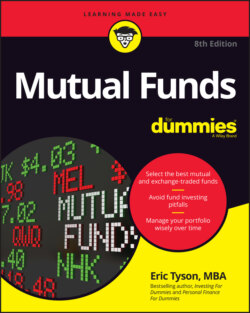Читать книгу Mutual Funds For Dummies - Eric Tyson - Страница 39
Funds save you money and time
ОглавлениеChances are the last thing you want to do with your free time is research where to invest your savings. If you’re like some busy people, you’ve perhaps kept your money in a bank account just to avoid the hassles. Or maybe you turned your money over to some smooth-talking broker who sold you a high-commission investment that you still don’t understand but are convinced will make you rich.
Mutual funds and exchange-traded funds are cheaper, more communal ways to get the investing job done. A fund spreads out the cost of extensive — and costly (for an individual) — research over thousands of investors. How does a fund save you time and money? Let me count the ways:
Funds can produce a much better rate of return over the long haul than a dreary, boring bank or insurance company account. You can purchase them by writing a check, calling a toll-free number, or opening an account online and sending in money electronically. What does it cost to hire such high-powered talent to do all the dreadful research and analysis? A mere pittance if you select the right funds, which I help name in this book. In fact, when you invest your money in an efficiently managed fund, the cost should be less than it would be to trade individual securities on your own.
Funds manage money efficiently through effective use of technology. Innovations in information-management tools enable funds to monitor and manage billions of dollars from millions of investors at a very low cost. In general, moving around $5 billion in securities doesn’t cost them much more than moving $500 million. Larger investments just mean a few more zeros in the computer database.
Many funds don’t charge a commission (load) to purchase or redeem shares. Commission-free funds are called no-load funds. Such opportunities used to be rare. Fidelity and Vanguard, the two largest distributors of no-load funds today, exacted sales charges as high as 8.5 percent during the early 1970s. Even today, some mutual funds known as load funds charge you a commission for buying or selling shares in their funds. (See Chapter 7 for the complete story on fund fees.)
